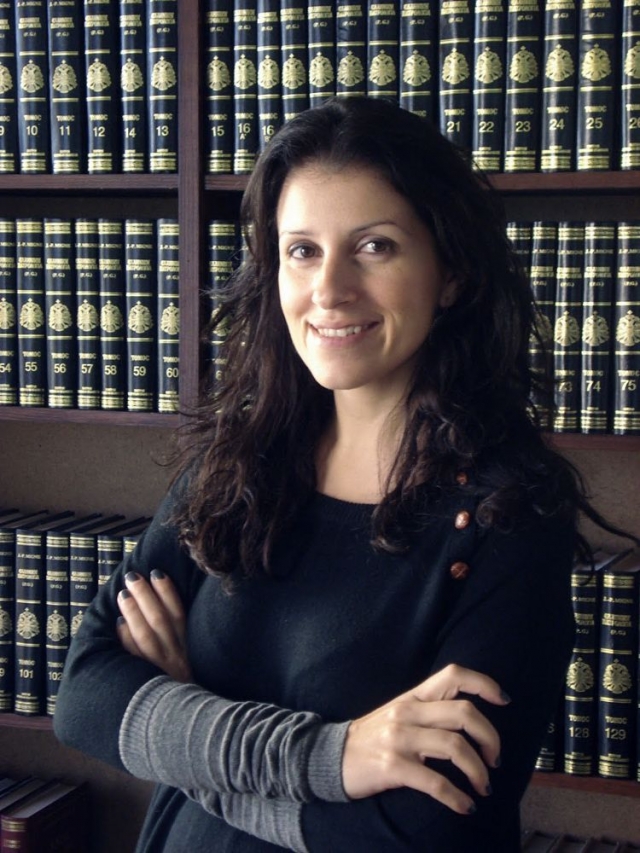Easter is approaching and thoughts of death, resurrection, sacrifice and self-sacrifice, God, history, the Bible, the Old and New Testaments with it. GRReporter offers the opinion of researcher Myrto Theocharous on all these issues. Zdravka Mihaylova talks to her.
 Cypriot by nationality Dr. Myrto Theocharous teaches at the Greek Bible College in Athens, Biblical Studies Department – Old Testament. She graduated in Theological studies at the Greek Bible College, Athens, (2005) pursuing afterwards graduate studies at Wheaton College, Illinois, (2007) in a two-year Master’s programme in Biblical Exegesis of the Old and New Testament. Her doctoral studies followed at the University of Cambridge where she defended a dissertation topic: “Comparison of the ancient Greek translation of the Septuagint with the Hebrew biblical text of the Twelve Prophets with the aim of finding and analyzing the use of intertextuality in the translation process”.
Cypriot by nationality Dr. Myrto Theocharous teaches at the Greek Bible College in Athens, Biblical Studies Department – Old Testament. She graduated in Theological studies at the Greek Bible College, Athens, (2005) pursuing afterwards graduate studies at Wheaton College, Illinois, (2007) in a two-year Master’s programme in Biblical Exegesis of the Old and New Testament. Her doctoral studies followed at the University of Cambridge where she defended a dissertation topic: “Comparison of the ancient Greek translation of the Septuagint with the Hebrew biblical text of the Twelve Prophets with the aim of finding and analyzing the use of intertextuality in the translation process”.
She is a member of various professional organizations: the European Association of Biblical Studies, the Society of Biblical Literature, the Evangelical Theological Society, the International Organization of Septuagint and Cognate Studies. She participated in the Text and Canon Project, Tyndale House, Cambridge, for the academic years 2008-2009. She held a part-time job engaged as a Professor of Advanced Hebrew at Artos Zoes Foundation (Ίδρυμα Άρτος Ζωής) in Athens. Apart from her scholarly activities she is a volunteer in Action against  Human Trafficking: Organization “New Life”(Athens) whose main aim is seeking out victims and offering spiritual, psychological and physical support to women in prostitution.
Human Trafficking: Organization “New Life”(Athens) whose main aim is seeking out victims and offering spiritual, psychological and physical support to women in prostitution.
Myrto Theocharous has participated in numerous conferences and seminars: “Sacramental Theology: The Eucharist in the Light of the Passover,” Wheaton College, IL, USA (2007), “The History of Zion as a Type for Women in Prostitution and Trafficking,” International Teams, IL, USA (2007), “An Introduction to the Septuagint: Its Origins, Reception, and Use in Biblical Scholarship,” The Greek Bible College, Athens, Greece (2007), “Holy Scriptures: Myth or Reality?”, Kalopothakis Centre, A’ Evangelical Church of Athens (2010), “The Hellenistic Jonah”, EABS Conference, Thessaloniki, Greece (2011), “God in Agony: The Prophetic Experience of the Divine Dilemma Between Justice and Love” [in Greek], Artos Zoes, Conference “The God of the Bible and the God of the Philosophers”, National Research Institute, Athens (2011) and has scholarly publications in academic journals.
Interview with Myrto Theocharous by Zdravka Mihaylova in exclusive for Grreporter.
You are a professor at the Greek Bible College in Athens, you were teaching Biblical Hebrew as well at the Artos Zoes Foundation. Would you elaborate in more detail if the Bible opens a prospect for modernity? If yes, in what ways?
Thank you very much for the invitation to share a little bit about my interests and my work in the Old Testament (OT). This is a very interesting question. I think that the Bible is as foreign in modernity as it is in postmodernity. If we accept that modernity rejects “the miracle” as offering any epistemological basis, then the Bible is not at home in modernity. It is very alien. It has its own logic, its own tradition and is therefore useless in offering any universally acceptable truths. There have been many attempts to find some usefulness for the Bible in modernity through the efforts of various scholars of the Enlightenment who tried to get behind the “myth” to the actual historical facts that took place. The “Historical Jesus” movement is one example and the project was to “demythologize” the text, throw out the husk of interpretation and keep the historical kernel.
Postmodernity, of course, reacts to this, pointing out that no view of the text can be impartial. Nobody can get to the “facts”. Everyone interprets and everyone carries their tradition’s presuppositions. In this sense, modernity is itself a specific tradition that tries to impose itself and eliminate other traditions. The Bible does find its space in postmodernity but it is not very comfortable there either due to its universal claims for the one God.
There is a danger, in modernity and postmodernity alike, to silence or manipulate the biblical text for one’s own purposes. But I think the text remains free, in a dynamic relationship with its readers but is also very challenging for every age. Its wisdom is relevant for the modern audience and one can relate to many things taught in its pages, but at the same time it remains an alien voice conversing with us. Not everyone is able to identify with the biblical narrative, though. I have students who have purely historical or cultural interests for it and others approaching the Bible primarily with religious interests. In Greece there is indeed a growing interest in biblical Hebrew and I am grateful for Artos Zoes facilitating the learning of this language.
You’ve participated in many academic conferences both in Greece (an Artos Zoes annual conference included) and abroad, a number of your studies have been published in specialized academic publications. What is the focus of your scholarly endeavours?